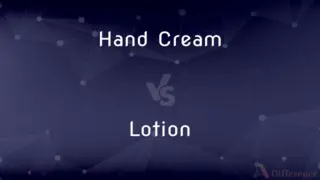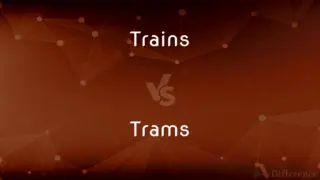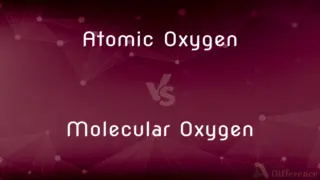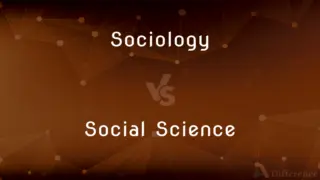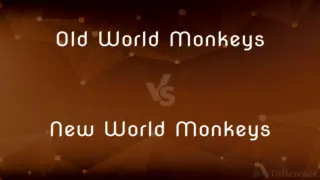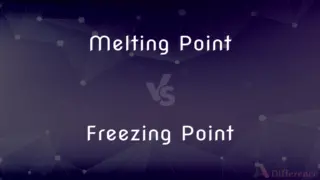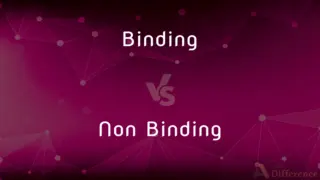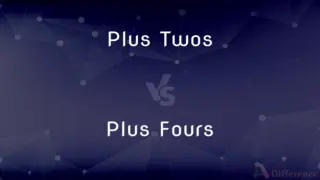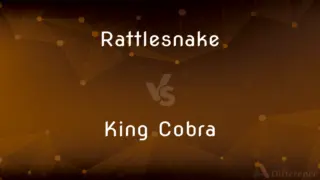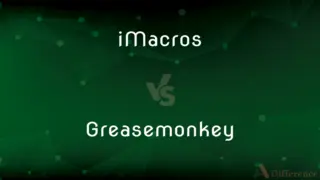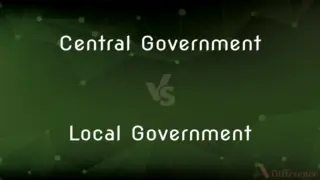Democracy vs. Monarchy — What's the Difference?
Edited by Tayyaba Rehman — By Fiza Rafique — Updated on September 30, 2023
"Democracy" is a system where citizens participate in decision-making, typically through voting. "Monarchy" is where a single person, usually by hereditary right, holds significant political power. They are contrasting governance systems.

Difference Between Democracy and Monarchy
Table of Contents
ADVERTISEMENT
Key Differences
"Democracy" and "Monarchy" represent two distinct governance structures. In a democracy, the power is vested in the hands of the people, either directly or through elected representatives. In stark contrast, a monarchy centralizes power, typically in a single individual, often based on hereditary succession.
Democracies emphasize the participation of their citizens in the decision-making process, usually through voting in elections. The foundation of democracy is the belief that every individual has a voice. Conversely, monarchies might offer limited public participation, with the monarch holding significant or absolute power.
While democracies are built on principles of equality and representation, monarchies often uphold traditions, lineage, and sometimes, divine rights. A democracy thrives on the idea that leaders are accountable to the populace. In a monarchy, the monarch's rule might be absolute or constitutional, with varying levels of checks and balances.
Comparison Chart
Basis of Power
Power from the people
Power from lineage or tradition
Decision-making
By citizens or their representatives
By the monarch (possibly with advisors)
ADVERTISEMENT
Typical Leadership Selection
Elections
Hereditary succession or appointment
Foundation
Equality, representation
Tradition, lineage
Variants
Direct, Representative
Absolute, Constitutional
Compare with Definitions
Democracy
A system where leaders are accountable to the people.
In a democracy, leaders can be voted out if they don't perform.
Monarchy
Rule by a single individual, often a king or queen.
The monarchy has been the country's system for centuries.
Democracy
Based on principles of equality and freedom.
Democracy upholds the rights and freedoms of its citizens.
Monarchy
A system where power may be absolute or constitutional.
The monarchy in that nation is merely ceremonial.
Democracy
Rule by the majority.
Democracy ensures the majority's will is considered in policies.
Monarchy
The institution involving a monarch and their duties.
The monarchy played a significant role in the nation's history.
Democracy
Democracy (Greek: δημοκρατία, dēmokratiā, from dēmos 'people' and kratos 'rule') refers to a form of government in which the people either have the authority to choose their governing legislators, or the authority to decide on legislation. Who is considered part of the people and how authority is shared among or delegated by the people has changed over time and at different speeds in different countries, but more and more of the inhabitants of countries have generally been included.
Monarchy
Governance based on heredity or appointment.
The monarchy passed from father to son.
Democracy
Government by the people, exercised either directly or through elected representatives.
Monarchy
A monarchy is a form of government in which a person, the monarch, is head of state for life or until abdication. The political legitimacy and authority of the monarch may vary from restricted and largely symbolic (constitutional monarchy), to fully autocratic (absolute monarchy), and can expand across the domains of the executive, legislative, and judicial.
Democracy
A political or social unit that has such a government.
Monarchy
Government by a monarch.
Democracy
The common people, considered as the primary source of political power.
Monarchy
A state ruled or headed by a monarch.
Democracy
Majority rule.
Monarchy
A government in which sovereignty is embodied within a single, today usually hereditary head of state (whether as a figurehead or as a powerful ruler).
An absolute monarchy is a monarchy where the monarch is legally the ultimate authority in all temporal matters.
A constitutional monarchy is a monarchy in which the monarch's power is legally constrained, ranging from where minor concessions have been made to appease certain factions to where the monarch is a figurehead with all real power in the hands of a legislative body.
Democracy
The principles of social equality and respect for the individual within a community.
Monarchy
The territory ruled over by a monarch; a kingdom.
Democracy
(uncountable) Rule by the people, especially as a form of government; either directly or through elected representatives (representative democracy).
Monarchy
A form of government where sovereignty is embodied by a single ruler in a state and his high aristocracy representing their separate divided lands within the state and their low aristocracy representing their separate divided fiefs.
Democracy
A government under the direct or representative rule of the people of its jurisdiction.
Monarchy
States based on a system of governance headed by a king or a queen.
Democracy
(countable) A state with a democratic system of government.
Monarchy
A state or government in which the supreme power is lodged in the hands of a monarch.
Democracy
(uncountable) Belief in political freedom and equality; the "spirit of democracy".
Monarchy
A system of government in which the chief ruler is a monarch.
In those days he had affected zeal for monarchy.
Democracy
Government by the people; a form of government in which the supreme power is retained and directly exercised by the people.
Monarchy
The territory ruled over by a monarch; a kingdom.
What scourage for perjuryCan this dark monarchy afford false Clarence.
Democracy
Government by popular representation; a form of government in which the supreme power is retained by the people, but is indirectly exercised through a system of representation and delegated authority periodically renewed; a constitutional representative government; a republic.
Monarchy
An autocracy governed by a monarch who usually inherits the authority
Democracy
Collectively, the people, regarded as the source of government.
Monarchy
Emphasis on tradition and lineage in governance.
The monarchy upholds age-old traditions.
Democracy
The principles and policy of the Democratic party, so called.
Democracy
The political orientation of those who favor government by the people or by their elected representatives
Democracy
A political system in which the supreme power lies in a body of citizens who can elect people to represent them
Democracy
The doctrine that the numerical majority of an organized group can make decisions binding on the whole group
Democracy
A system where citizens have a say in governance.
Democracy allows people to voice their opinions through voting.
Democracy
Governance through elected representatives.
The country transitioned to a democracy after years of dictatorship.
Common Curiosities
Can a country be both a democracy and a monarchy?
Yes, constitutional monarchies like the UK have both elected officials and a ceremonial monarch.
How is power transferred in a democracy?
In a democracy, power is typically transferred through elections.
Can monarchies be modern and progressive?
Yes, some monarchies have modernized and even incorporate democratic elements.
Is freedom of speech a hallmark of democracy?
Yes, freedom of speech is a fundamental principle in most democracies.
How long can a monarch rule?
In a monarchy, a monarch can rule for life, but the duration varies based on the system and country.
Which system is older, democracy or monarchy?
Monarchy is older, but ancient forms of democracy existed, like in Athens.
What's the main advantage of democracy?
Democracy promotes representation and accountability.
Is a monarch always a dictator in a monarchy?
No, in constitutional monarchies, the monarch's role is often ceremonial.
Are "Democracy" and "Monarchy" opposites?
Not necessarily, but they represent different governance systems.
Can citizens vote in a monarchy?
It depends on the type of monarchy; some allow limited voting, while others don't.
Share Your Discovery

Previous Comparison
Pigeon vs. Dove
Next Comparison
Healthy vs. HealthfulAuthor Spotlight
Written by
Fiza RafiqueFiza Rafique is a skilled content writer at AskDifference.com, where she meticulously refines and enhances written pieces. Drawing from her vast editorial expertise, Fiza ensures clarity, accuracy, and precision in every article. Passionate about language, she continually seeks to elevate the quality of content for readers worldwide.
Edited by
Tayyaba RehmanTayyaba Rehman is a distinguished writer, currently serving as a primary contributor to askdifference.com. As a researcher in semantics and etymology, Tayyaba's passion for the complexity of languages and their distinctions has found a perfect home on the platform. Tayyaba delves into the intricacies of language, distinguishing between commonly confused words and phrases, thereby providing clarity for readers worldwide.














